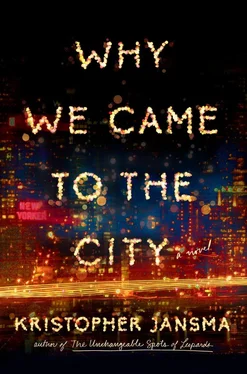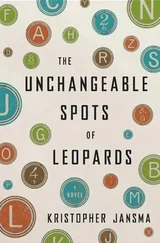William left the video store feeling stone-jawed. This lasted two thirds of his way home, when he slipped on a patch of ice and slid into the branches of one of those Christmas trees out for sale on the sidewalk.
• • •
Irene went over immediately. She’d thought about going back to her place for his scarf, but she didn’t want to waste time and risk him losing interest. William greeted her at the door and said he had just been watching an old movie and asked how she was feeling. But she cut him off — she didn’t want to talk about that. She instead gushed that she loved old movies and that she would have to insist they watch the rest together. She hated to interrupt when he was being so generous. But after an hour passed, sitting there on the couch watching Grant and Fontaine flirting, Irene found it difficult to focus.
William’s apartment distressed her. More and more, Irene felt as if she were watching the movie from the set of another movie. Not only was his place achingly coordinated in maroons and teals and mahogany leather, but it was filled with showroom-style homey touches. On one wall above a sideboard hung a gigantic bronze architect’s compass, surrounded by framed black-and-white photos: a medieval cathedral apse, a Roman atrium, the gable of a seaside cottage. She was positive these were not vacation photos but the kind of black-and-white “art” pictures that you could get twelve for ten at IKEA. She was grateful that he didn’t have a single Christmas decoration up, but she’d have preferred an evergreen to the inexplicable basket of neatly arranged branches that sat in the corner. It was like something you saw in a magazine, not anything that a real person owned. Steadily, she became convinced that she was sitting in the completely fabricated living room of a completely fabricated person.
Irene excused herself to use the restroom, and William paused the movie. On the way down the hall she looked for evidence of a personality, photographs of friends or kitschy mementos, but she found nothing. William’s family was Korean, yet she couldn’t spot a single piece of art with any Asian influence whatsoever. She knew that he had studied classics in college, but the only Greek object she saw was a small urn, filled not with significant ashes but with potpourri that didn’t smell of anything anymore. What sort of self-respecting bachelor owned potpourri? In the bathroom Irene found a mirror whose frame was strategically flaked of its paint, and a little soap dispenser adorned with tiny, irregular mosaic tiles, as if some artisan a millennium ago had carefully glued them onto a Crate & Barrel sanitizer pump. On the way back to the couch, she checked his bookshelf to be sure the spines had been cracked. She was relieved to find that, at least, William wasn’t the full Gatsby.
It didn’t help that he himself was speaking like a movie character. “Could I pour you another glass of wine?” he asked when she got back. Once he did, he looked up as if he’d just surprised himself with the thought and said, “Pass me the clicker, if it’s not too much trouble. The sound is a little dim , wouldn’t you say?”
“You smell like pinesap,” Irene said as she passed him the clicker.
“Ah, yes. I had a run-in with a tree salesman out on the street. Nice fellow, though he shouted a bit when I ran off.”
“Are you being British?” she asked.
That seemed to catch him somewhat, and his cheeks reddened in the way that she remembered. “Not intentionally, no. I suppose I should take that as a compliment.”
“Should you?” Irene asked under a sigh.
William didn’t hear, now the volume was up.
When the movie was over, Irene was tired but too uncomfortable to sleep. She didn’t want to stay in the false-living room. Nor did she want to go to bed with this false-William.
“I think maybe I should go,” she said finally.
William looked sad. “Oh! Well. All right then. Wait here. I’ll call for a car.”
“The city’s full of cabs, William,” she said. “Cabs and sidewalks and trains. Christ, what I wouldn’t give to be on a train right now.”
“Sorry if you didn’t like the film,” he said stiffly.
“The film was fine,” she said.
“You’re upset.” He frowned without quite pouting.
“No, not at all,” Irene said, getting up to leave. She didn’t know just what sort of coaxing it was going to take to get him to relax, but she was pretty sure she had 68 percent less time for it now than she’d had a few weeks ago. It had been a ridiculous idea to come in the first place.
“Where are you going?” he asked, as she was putting her boots back on.
“Look, William—”
“No, I mean, I get that you’re leaving. It’s just, you said you couldn’t stay at your apartment tonight, and I know Sara said everyone was going out of town. I was worried that — well, do you have anywhere else to go?”
Irene tossed her coat over her shoulders angrily. “You don’t need to look after me, all right? I have lots of places to go.”
This always happened. Guys — especially nice ones like William — were always trying to persuade her she needed to be taken care of. It was only the losers and fuck-ups who left her to take care of herself. She tried to remind herself that William didn’t know her whole history. All the worse places she’d slept than a bug-bombed apartment, which hers wasn’t even, though again he didn’t know that.
Her left arm kept getting jammed in the sleeve. She couldn’t bend her elbow after all the blood they’d taken that afternoon, which only made her more upset.
“I’ve got friends all over! I’m serious. I could walk over to Penn Station right now, get on any train at all, and I’d be fine .”
William was standing there, nodding, rocking a little on his heels. Irene had her coat on and was at the door. Was he really just going to stare at the floor and not say anything?
“Well,” Irene said finally, “what?”
He looked up at her. “Well, what what?”
“What are you doing ?” she specified.
He stopped rocking. “Sorry. Just thinking. Sorry.”
“What about?”
“The film. Movie. The ending,” he sighed. “Originally Hitchcock wanted Fontaine to write a letter to her mother saying she knows Grant’s a killer but she loves him so much that she’ll die for him. Then she drinks the poison, and it would have ended with Grant mailing the letter. But the studio felt that it should end with a killer being brought to justice — so they forced Hitchcock to change it so Grant attempts suicide.”
Irene couldn’t believe he was still talking about the film — movie. Whatever. “That’s completely absurd,” she said.
“Right. I agree. Someone that confident and controlled would never consider suicide—”
“No, that’s not absurd,” Irene interrupted. “He’s an arrogant prick. And killing yourself like that would be the ultimate act of arrogance.”
This brought out the red in William’s cheeks again.
“What I meant is it’s absurd to think he could really kill her .” The flush spread; Irene stepped closer to him and the couch. “In that first scene, right after I came in, where they’re walking outside together and it’s all very romantic and then he calls her Monkeyface, and she gets angry? No self-respecting murderer would call a woman Monkeyface like that. Hitchcock must have known that.”
Suddenly Mount Sinai felt miles and miles away.
Irene looked into his dark eyes and said, “So I think you should hurry up and give me a nickname like that right away, so I’ll be sure you’re not a murderer.”
William laughed. “I can’t! You’re, well, um — too beautiful to make fun of.”
Читать дальше












